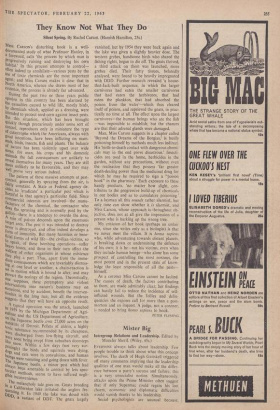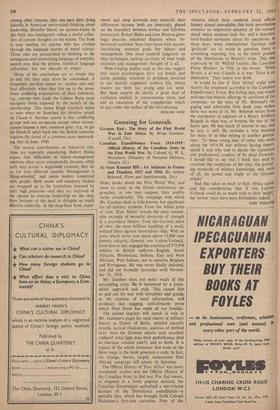Mister Big EVERYONE always talks about leadership. Fel.% people trouble
to think about what this concept involves. The death of Hugh Gaitskell triggered off many comments implying that the leadership qualities of one man would make all the differ- ence between a party's success and failure; this is a very unsocialist notion. Simultaneously, attacks upon the Prime Minister often suggest that if only Supermac could regain his lost charm, economic and diplomatic difficulties would vanish thanks to his leadership.
Social psychologists are unusual because, among other reasons, they can earn their living (usually in American universities) thinking about leadership. Muzafer Sherif, an opinion-leader in this field, has intelligently edited a useful collec- tion of current thoughts on the matter. The book is easy reading for anyone who has crashed through the language barrier of social science. Those who are accustomed to thinking in the ambiguous and constricting language of everyday speech may find the precise, technical language unfamiliar, but not obscure or empty.
Many of the conclusions are so simple that in real life they may often be overlooked. A frequently invoked axiom is: leaders can only lead effectively when they live up to the some- times confining expectations of their followers; e.g., anyone who leads the Labour Party must recognise limits imposed by the beliefs of the membership. This lesson Hugh Gaitskell failed to note when he launched his abortive attack on Clause 4. Another axiom is that conflicting groups will not co-operate except when circum- stances impose a new, common goal : e.g., to get the Dunkirk spirit back into the British economy requires the threat of a common cause approach- ing that of June, 1940.
The several contributions on industrial rela- tions are especially stimulating. Robert Dubin argues that difficulties in labour-management relations often occur unexpectedly because, while both may accept a negotiated contract, they do so for very different reasons. Management is `thing-oriented,' and union leaders concerned with people. Both union and company leaders are wrapped up in the formalities imposed by their high positions—and they are deprived of the chance to exercise leadership on the shop floor because of the need to delegate so much effective authority. At the shop-floor level, super- visors and shop stewards may intensify their differences because both are insecurely placed on the boundary between worker and full-time bureaucrat. Robert Blake and Jane Mouton glow- ingly describe industrial disputes where 'be- havioural scientists' have intervened with success, introducing common goals for labour and management. One must suspend judgment on their techniques, lacking accounts of what trade unionists and management thought of it all.
Wide-ranging studies such as this one suggest that social psychologists have not found, and rarely promise, solutions to problems involved in our heavily organised modern life, where leaders are both too strong and too weak. But these experts do clarify a great deal of confusion implicit in commonsense views, and add an awareness of the complexities which lie just under the surface of the (sic) obvious.
RICHARD ROSE



































 Previous page
Previous page